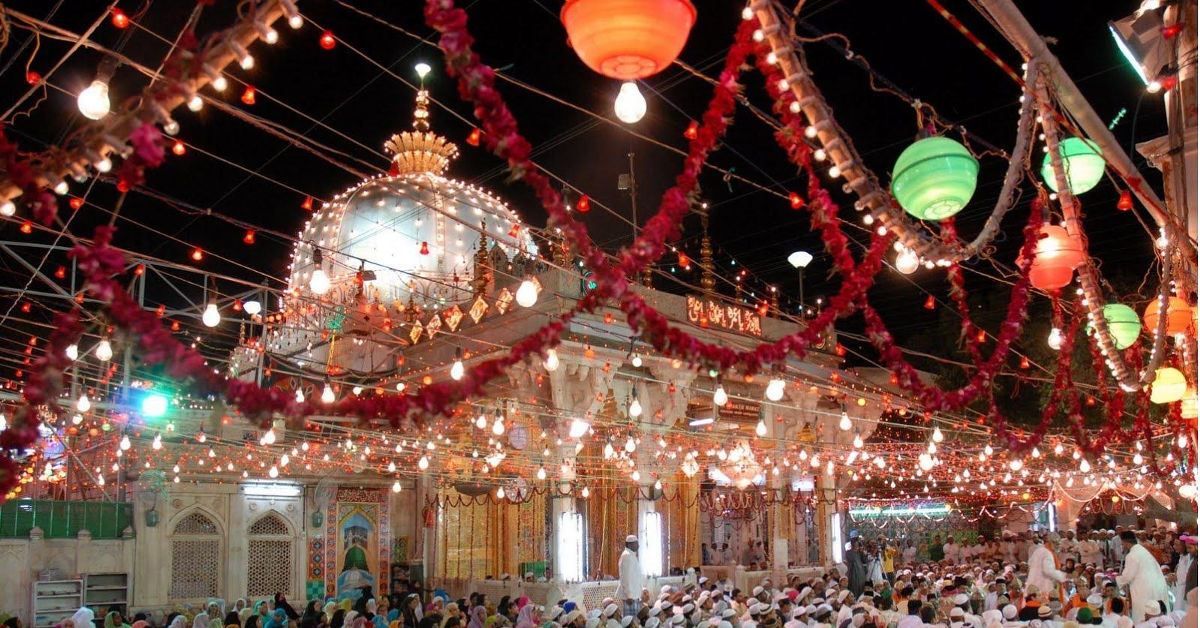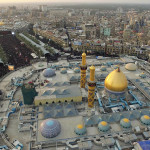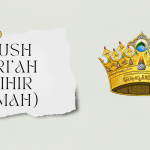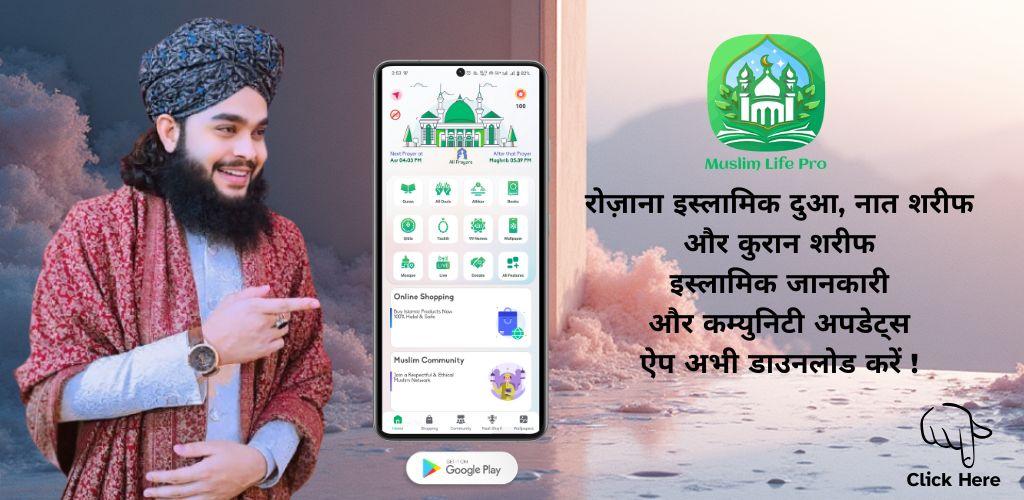Hazrat Sheikh Khwaja Syed Moinuddin Hasan Chisti Order: Chisti Born: 530 AH/1136 AD Isfahan or Sistan (Modern-day Iran) Passed away: 627 AH/1230 AD Ajmer, India Resting place: Ajmer, India, Map of Burial Place Title(s):Gharib Nawaz, Sultan-ul-Hind
[google-map]FJ4H+C7 Ajmer, Rajasthan[/google-map]
Hazrat Sheikh Khwaja Syed Moinuddin Hasan Chisti (ra) (also spelled Moinudeen, Moin-ud-din, Muinuddin) also known as Gharib Nawaz (Benefactor of the poor) was one of the most outstanding saints of the Indian subcontinent, and indeed an international spiritual inspiration who lived during the 6th Century AH (12th Century AD). He introduced and established the Chisti order in South Asia and significantly contributed to the spreading of Islam there.
FAMILY & LINEAGE
Khwaja Moinuddin Chisti (ra) was both a Hasani (maternal) and Husseini (paternal) Syed.
He was blessed with direct lineage to the Holy Prophet ﷺ through his father, Khwaja Ghiyasuddin Hasan (ra), who was a direct descendant of Hazrat Imam Hussein , son of Hazrat Ali . His silsila-e-nasab (family lineage) is as follows:
- Hazrat Khwaja Moinuddin Chisti (ra), son of
- Hazrat Khwaja Ghiyasuddin Hasan (ra), son of
- Syed Ahmed Hassan (ra), son of
- Syed Hassan Ahmed (ra), son of
- Syed Najmuddin Tahir (ra), son of
- Syed Khwaja Abdul Aziz Hussain (ra), son of
- Syed Imam Mohammad Mehdi (ra), son of
- Syed Imam Askari (ra), son of
- Hazrat Imam Musa (ra), son of
- Imam Ali Naqi (ra), son of
- Hazrat Imam Mohammad Taqi (ra), son of
- Hazrat Imam Ali Musa Raza (ra), son of
- Hazrat Imam Musa (ra), son of
- Hazrat Imam Mohammad Jafar Sadiq (ra), son of
- Hazrat Imam Mohammad Baqir (ra), son of
- Hazrat Imam Zainul Abedin (ra), son of
- Hazrat Imam Hussain , son of
- Hazrat Imam Ali , son-in-law of
- The Holy Prophet Hazrat Mohammad Mostafa ﷺ
His father, an accomplished man, was well-educated and trained, and a great Sufi of his time. His piety and scholarship won him widespread respect and regard, and was held in high esteem by the Sufis of Khorasan.
Khwaja Moinuddin Chisti (ra) was also blessed with direct lineage to the Holy Prophet ﷺ through his mother, Umm-ul-Warah (ra) (alias Bibi Mah Noor), who was a descendant of Hazrat Imam Hasan .
His great grandfather, Khwaja Syed Ahmad Husain, migrated from Samarra in Iraq and eventually settled in Sanjar, within the region of Sistan.
He was also closely related to al-Ghawth al-A’zam, Sheikh Abdul Qadir Jilani (ra).
It is also said that he had two brothers.[1]
BIRTH
Khwaja Moinuddin Chisti (ra) was born in Sanjar within the region of Sistan in modern-day Iran. Another source says he was born in Isfahan.[2] He was born in 530 AH (1136 AD).[3]
At the time of his birth, Sistan and its surrounding lands were experiencing unprecedented bloodshed and plunder at the hands of Tatars, and other rebels. These intruders had taken advantage of the weak government of Sultan Ahmed Sanjar.
Due to these disturbances in Sistan, Khwaja Ghiyasuddin Hasan (ra), father of Khwaja Moinuddin Chisti (ra), decided to leave Sistan for a safer place. He migrated with his family to Khorasan. It was a great hub of intellectual and economic activity and was home to learned Ulama and reputed Sufis. There were rich gardens and canals along with flourishing agricultural fields. Khwaja Ghiyasuddin Hasan (ra) settled down in the vicinity where he bought an orchard along with a windmill.
EARLY LIFE
During his childhood he showed early promise of a marvellous personality, displaying rare piety and sacrifice for others.
On the occasion of a certain Eid, when he was still a child, Hazrat Moinuddin Chisti (ra), richly attired, was going to Idgah to offer his prayers. On the way, he saw a blind child dressed in torn clothing. Deeply moved, he gave the child his own clothes and accompanied him to the Idgah. When only three or four years old, rather than playing with children of his age, he would invite these children to eat with him.
Khwaja Moinuddin Chisti (ra) was brought up in Khorasan and received his early education at home. When he was nine years old, he committed the Holy Quran to memory. Subsequently, he was admitted to a Maktab, where he concentrated primarily on the hadis and fiqh (jurisprudence), and completed his education very early.
Khwaja Moinuddin Chisti (ra) was about fifteen years old when his father died in 544 AH. He was extremely heart-broken. Prior to his father’s death, the Tatar invaders had entered Khorasan and ransacked the province. Hardly a year had passed since the death of Khwaja Moinuddin Chisti’s (ra) father, when the Tartars once more ransacked Khorasan and repeated the same drama. He was overwhelmingly dismayed to see these scenes of terrible devastation.
TURNING POINT
One day, when he was watering his garden, between the months of Sha’aban and Zul-Hijjah in the year 544 AH/1150 AD, a mystic named Ibrahim Qandoozi (ra) unexpectedly entered. Khwaja Moinuddin Chisti (ra) extended to him the utmost courtesy and a hearty welcome, and offered him a bunch of grapes. The mystic was greatly pleased by the hospitality and the respect shown to him and wanted to repay Khwaja Moinuddin Chisti (ra). He took out a piece of oil cake and upon chewing a portion of it, gave the rest to Khwaja Khwaja Moinuddin Chisti (ra) to eat. As soon as he had eaten it, he underwent a strange transformation. He felt repugnance for mundane matters and sought to pursue the higher virtues and seek out the truth.
After the death of his father, he had inherited a grindstone and the orchard, which constituted his source of income. He sold his grindstone and the orchard and distributed the proceeds of these amongst the needy, the indigent, and the poor.
SPIRITUAL JOURNEY
In those days, Baghdad, Samarkand, and Bukhara were celebrated centres of Islamic learning. From Khorasan he proceeded to Samarkand and then to Bukhara, where he pursued higher studies.[4] He stayed there for about five years, from 544 AH/1150AD up to 550 AH/1155AH continuing his education up to the age of twenty. He counted among his teachers the two outstanding scholars of his time, namely, Maulana Husamuddin of Bukhara (ra) and Maulana Sharfuddin (ra).
When Khwaja Moinuddin Chisti (ra) had acquired the best knowledge and wisdom of the time, he travelled widely in search of a spiritual guide who could provide him with the best spiritual guidance.
He reached Iraq in 551 AH/1156 AD where he met the renowned saint Hazrat Sheikh Abdul Qadir Jilani (ra), better known as al-Ghawth al-A’zam, in Baghdad for the first time.[5] On meeting Khwaja Moinuddin Chisti (ra), Hazrat Sheikh Abdul Qadir Jilani’s (ra) forecast for him was:
This young man will be a great figure of his time. He will be a source of inspiration and a centre of devotion and the focus of affection to myriads of people.
The prophecy proved correct.
Subsequently, Khwaja Moinuddin Chisti (ra) left Iraq for Arabia, and from there he proceeded to Haroon in Iran. In Haroon, he had the unique privilege of meeting the famous saint Hazrat Khwaja Usman Harooni (ra), who accepted him as his spiritual disciple.
He spent two and a half years in the company and service of Hazrat Khwaja Usman Harooni (ra), acquiring spiritual attainments and undertaking ascetic practices, and eventually won the approval of his spiritual guide and teacher. He was given the permission to enlist and accept disciples himself and was appointed a spiritual caliph.[6]
He left Haroon for Baghdad, where he met Sheikh Abu Najeeb Suhrawardi (ra). In 555 AH/1160 AD, he travelled to Syria where he met a saint called Ohad Mahmud Al-Wahidi Ghaznavi. He then proceeded to Kerman and from there he returned to Baghdad, and then proceeded to Hamedan.
On his way to India, he visited Tabriz, Astarabad, Bukhara, Kharqan, Samarkand, Memna, and Herat. He finally reached Multan on the tenth of Muharram of 561 AH/1165 AD. He then left Multan for Lahore where he spent time at the tomb of Hazrat Sheikh Ali Hujwiri (ra) better known as Data Ganj Bakhsh.
On his return journey, he visited Ghazni, Balkh, Astarabad, and Rey. On reaching Baghdad, he offered his respect to his spiritual guide and teacher Hazrat Khwaja Usman Harooni (ra), who was then in Baghdad.
ख्वाजा गरीब नवाज 14 रजब 536 हिजरी (1142 ईस्वी) को पीर (सोमवार) के दिन सिस्तान (ईरान देश का एक गांव) में पैदा हुए। कुछ विद्वान इनकी पैदाइश की तारीख और जन्म की जगह को अलग अलग बताते हैं। बहरहाल 9 साल की उम्र में आप हाफिज ए कुरान हो गए। ख्वाजा साहब की तालीम उनके घर पर ही हुई थी। विरासत में आपको एक छोटा सा बाग़ और एक पनचक्की मिली थी। हज़रत इब्राहिम कंदोजी से मुलाकात होने के बाद जब दिल की दुनिया बदली तो उसे बेच कर पैसा गरीबों में बांट दिया और खुद हक़ की तलाश में निकल पड़े।
आपने -अपने पीर हज़रत ख्वाजा उस्मान हारुनी रहमतुल्लाह अलैह कि 20 साल तक खिदमत की, इस दौरान आप हज़रत का बिस्तर, खाने के बर्तन, पानी की मशक और अपना सामान कंधे पर लाद कर घूमते फिरे।आपने 51 बार पैदल हज पर फ़रमाया और 52 साल की उम्र में 587 हिजरी (1192 ई.) में हिंदुस्तान तशरीफ़ लाएं।
अजमेर पहुंचकर आपको इस्लाम की तब्लीग़ शुरू करने से पहले किन किन हालात से दो-चार होना पड़ा उसे दोहराने की जरूरत नहीं। बहरहाल आपने अपनी रूहानी ताकत से शाही और शैतानी ताकतों का मुकाबला फरमा कर उन्हें ज़ेर फरमाया। आप हमेशा लोगो के लिए काफी फिकरमंद रहते थे।
आप गरीबों, दुखी लोगों के मसीहा बने, इंसानियत की खिदमत को अपना मिशन बनाकर इस्लाम की तब्लीग़ शुरू फ़रमाई।आपने अजमेर और आसपास के इलाको में इस्लाम,अमन और शांति का पैगाम घर घर पहुंचाया।
आपने एक ही कपड़े में जिंदगी बिताई। कपड़े फटने पर पैवन्द लगा लिया करते थे। पैवन्द लगाते लगाते उसका वजन साढ़े छह किलो हो गया था।
6 रजब 633 हिजरी में आप अजमेर में पर्दा फरमा गए। इंतकाल के बाद आपकी पेेशानी पर नूरानी हरफों में लिखा हुआ था "हाजा हबीबुल्लाह माता फी कुतुबुल्लाह" मतलब की यह अल्लाह का दोस्त है जिसने अल्लाह की मोहब्बत में वफ़ात पायी। हजरत ख्वाजा मोइनुद्दीन चिश्ती रहमतुल्लाह अलैह की बरकत से हिंदुस्तान में इस्लाम का नूर फैला।
आपने कभी पेट भर खाना नहीं खाया कई कई दिनों तक भूखे रहने के बाद सूखी रोटी के टुकड़े पानी में भिगोकर खा लिया करते। आप 24 घंटे के अंदर पुरे कुरान शरीफ की तिलावत कर लिया करते थे। आपने तकरीबन 70 साल तक लगातार पूरी रात आराम नहीं फरमाया।
आप 70 साल तक दिन रात के अक्सर औक़ात बावज़ू रहे, आप तो वली थे ही लेकिन आप जिस पर एक नजर डाल देते वह भी वली हो जाता। काफी दिनों तक आप इस्तिगराक(किसी चीज़ में डूब जाना) के आलम में रहे आंखें बंद किए ज़िक्रे इलाही में गुम रहते। नमाज के वक्त हुजरे से बाहर तशरीफ ला कर जमाअत से नमाज अदा फरमाया करते।
आज भी आपका आस्ताना दीन दुखियों और हक़परस्तो के लिए मर्कज़े अकीदत बना हुआ है, जहां रोजाना हजारों आते हैं और फ़ैज़ पाते हैं।आज भी अजमेर को आप के नाम से दुनिया में जाना जाता हैं। सालाना उर्स के दौरान दुनिया भर के लाखो लोग आपके दरबार में दुआएं/मुरादे मांगने आते हैं।






